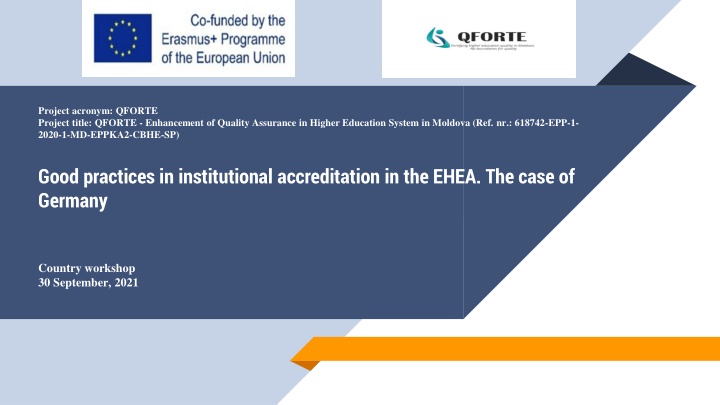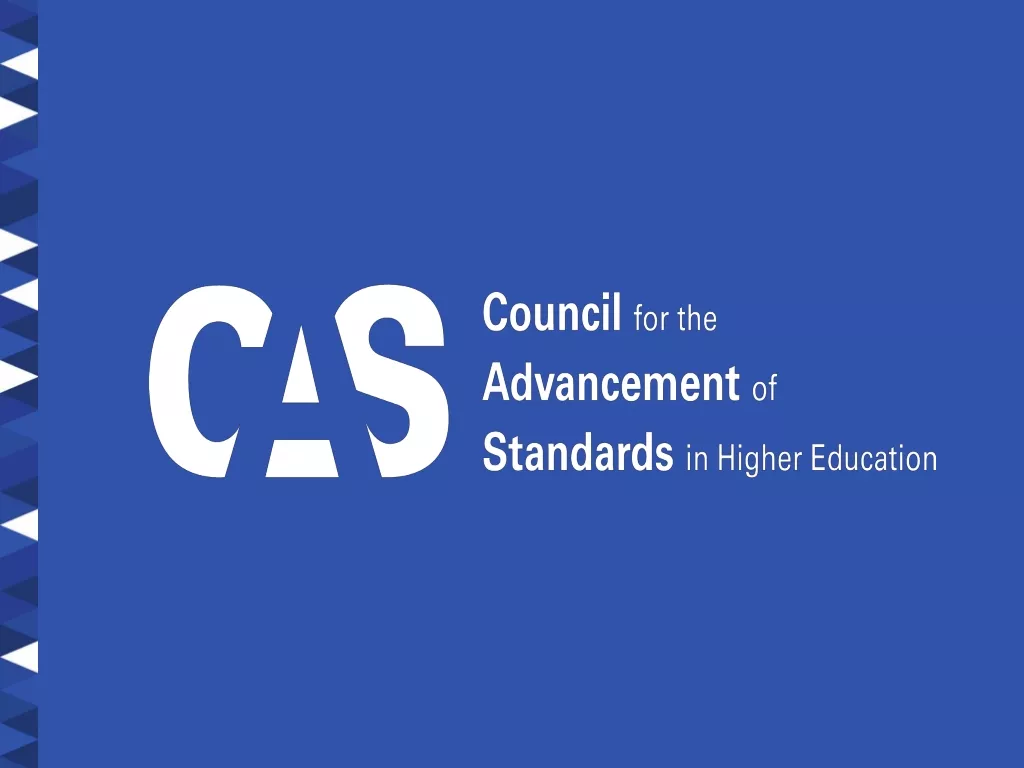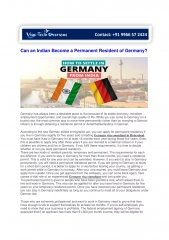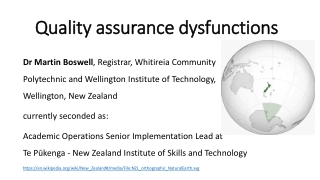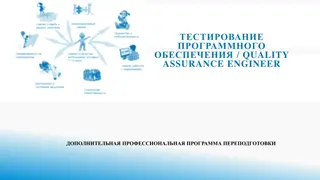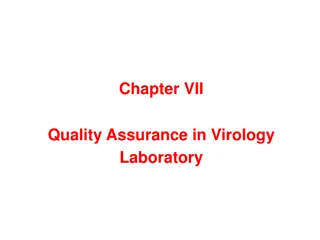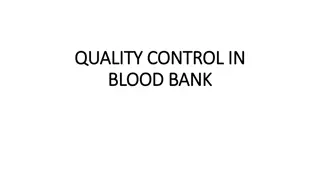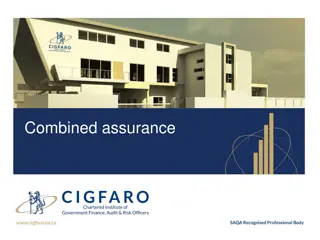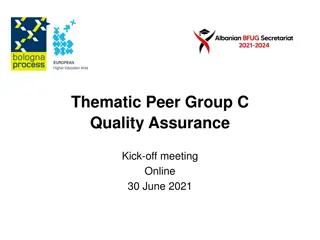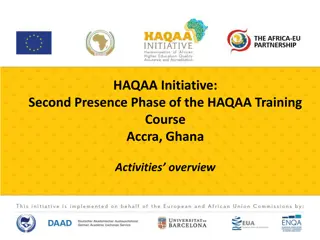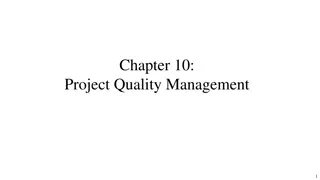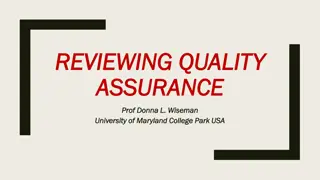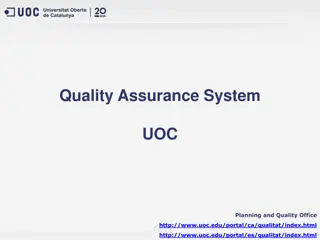Quality Assurance in Higher Education System of Germany
The higher education system in Germany comprises a diverse range of institutions, including universities, universities of applied sciences, colleges of art or music, and others. With a focus on research and offering a variety of academic disciplines, German higher education institutions play a vital role in conferring degrees and fostering academic excellence. Government-funded and private institutions uphold stringent standards, with state recognition essential for awarding recognized German degrees. The system encompasses a wide array of undergraduate and postgraduate programs, emphasizing Bachelor's and Master's degrees while also catering to specialized fields such as medicine and law.
Download Presentation

Please find below an Image/Link to download the presentation.
The content on the website is provided AS IS for your information and personal use only. It may not be sold, licensed, or shared on other websites without obtaining consent from the author.If you encounter any issues during the download, it is possible that the publisher has removed the file from their server.
You are allowed to download the files provided on this website for personal or commercial use, subject to the condition that they are used lawfully. All files are the property of their respective owners.
The content on the website is provided AS IS for your information and personal use only. It may not be sold, licensed, or shared on other websites without obtaining consent from the author.
E N D
Presentation Transcript
Project acronym: QFORTE Project title: QFORTE - Enhancement of Quality Assurance in Higher Education System in Moldova (Ref. nr.: 618742-EPP-1- 2020-1-MD-EPPKA2-CBHE-SP) Good practices in institutional accreditation in the EHEA. The case of Germany Country workshop 30 September, 2021
CONTENTS The higher education system of Germany The higher education system of Germany Goals of QA assurance system Goals of QA assurance system Areas covered by QA system Areas covered by QA system The role of external QA in the country The role of external QA in the country Institutional accreditation (criteria) Institutional accreditation (criteria) The role of internal QA in the country The role of internal QA in the country QA institutional strategy and action plan QA institutional strategy and action plan Stakeholders involvement in QA Stakeholders involvement in QA Benefits and challenges of QA country system Benefits and challenges of QA country system 2
The higher education system of Germany Higher education institutions (HEI) Higher education institutions (HEI) 397 HEI (115 universities, 217 universities of applied sciences, 57 colleges of art or music, 8 others) Universities offer the whole range of academic disciplines, put the focus on research and have the right to confer doctoral degrees. Universities of applied sciences concentrate their study programmes in engineering and other technical disciplines, business-related studies, social work and design areas; almost a third of students. Colleges of art or music: core objective- to develop as artistic individuals, right to confer doctoral degrees and the post-doctoral Habilitation qualification for the title of professor; two percent of all students 3
The higher education system of Germany. Government Government- -funded and private HEI funded and private HEI All HEI are either state or state recognised. The private HEI need the state recognition in order to be able to award recognized German degrees. The precondition for the state recognition is the institutional accreditation by the German Scientific Council ( Wissenschaftsrat (WR) ). 279 government-funded HEI and 108 private HEI (small institutions with limited range of subjects) 2,8 mln. students, 94 % of students enrolled in pubic HEI 4
The higher education system of Germany Degree programmes Degree programmes approximately 10.500 different undergraduate programmes and 9.500 post graduate degree programmes essentially: Bachelor s degrees and Master s degrees in addition - state-certified programmes for medicine, law and the training of teachers some remaining degree programmes that lead to a Diplom qualification additionally - formalised doctoral programmes 5
The higher education system of Germany Overview of the German degree structure Overview of the German degree structure Subject to accreditation: Master s programme (Master s degree), more practice-oriented or more research- oriented: 1 to 2 years Bachelor s programme (Bachelor s degree): 3 to 4 years Certified by the state: Integrated programme (Diplom degree/ Magister Artium): 4 to 5 years Staatspr fung (state exam): 3 to 6,5 years Diplom (FH) degree: 4 years Doctoral studies (Doctoral degree): 3 to 4 years 6
The goals of the quality assurance The German accreditation system has been introduced in 1998 as part of a greater structural reform of study programmes (Bologna reform). Main goals: Main goals: continuous modernization of the system compliance with the European standards and guidelines response to the increasing European and international competition and cooperation appropriate instruments and procedures of quality assurance for new programmes 7
The goals of the quality assurance Accreditation of study programmes Accreditation of study programmes Why? Why? since the Bologna reform basic and consecutive study programmes (B.A. & M.A.) are no longer subject to federal state approval but under the condition that study programmes will be assessed externally in some federal state laws the requirement for accreditation is regulated, in others accreditation is only recommended public sector employers in particular prefer applicants from accredited study programmes 8
The goals of the quality assurance Concrete tasks of the Accreditation Council Foundation Concrete tasks of the Accreditation Council Foundation: accreditation and re-accreditation of study programmes and internal quality assurance systems of HEI definition of the conditions for the recognition of accreditations by foreign institutions, taking into account developments in Europe promotion of international cooperation in the field of accreditation and QA regular reports to the L nder on the development of the consecutive system of study and on quality development within the framework of accreditation admittance of agencies for the assessment and preparation of an expert opinion with decision and evaluation recommendations supporting the L nder in the further development of the QA system 9
Areas covered by QA system Accreditation of study programmes Accreditation of study programmes programme or system accreditation programme or system accreditation only for relevant for teaching and learning teaching and learning, not including areas of research or administration for areas, structures and processes directly for special purposes other forms of accreditation including teaching and research structures and sometimes administration are available through special institutions, e.g. European Association of Establishments for Veterinary Education Association to Advanced Collegiate Schools of Business UniCert (for language teaching) 10
The role of external QA Legal Basis for Accreditation of study programmes: Interstate Study Accreditation Treaty ( Studienakkreditierungsstaatsvertrag ); since January 2018 common rules and regulations laid down in a Specimen Degree ( Musterrechtsverordnung ), which can be added by additionally state regulations decision making authority: Foundation Accreditation Council ( Stiftung Akkreditierungsrat ); originally founded 1998 as a authority of the state North Rhine-Westphalia 11
The role of external QA Accreditation of study programmes external (by an agency) internal (by the university) alternative procedures institutional accreditation programme accreditation 12
The role of external QA External/Programme Accreditation External/Programme Accreditation programme accreditation carried out by an accreditation agency by an accreditation agency agencies will be authorised by the Foundation Accreditation Council they are privately (or in some kind of public-private partnership) organise e.g. ACQUIN, AQAS: ASIIN, evalag, ZEvA a programme accreditation (bundle of B.A.+M.A.) costs around 8.000 since 2018 the agency will review and assess the study programme, but the Accreditation Council makes the decision 13
Institutional Accreditation Institutional/System Accreditation Institutional/System Accreditation universities can accredit their study programme themselves (without an agency and without the Accreditation Council) if they are entitled to do so by the Accreditation Council need of undergoing an institutional/system accreditation ( Systemakkreditierung ) beforehand system accreditation 14
Institutional Accreditation Institutional/System Accreditation Institutional/System Accreditation subject: internal quality assurance system of a higher education institution with system accreditation, a higher education institution receives the right to award the seal of the Accreditation Council the seal of the Accreditation Council for its self-assessed study programmes right to award internal assessed study programmes are one equal terms with external accredited ones 15
Institutional Accreditation Requirements for Institutional/System Accreditation Requirements for Institutional/System Accreditation established quality assurance system (QAS) in teaching and learning for the whole university adopted orders for evaluation and QA already some measurable outputs of the QAS at least one study programme bundle (B.A.+M.A.), which passed through the entire circle of the QAS several study programmes from the entire range of subjects as a random sample 16
Institutional Accreditation Criteria for Institutional/System Accreditation Criteria for Institutional/System Accreditation criteria set in Specimen Degree study programmes have to follow the same formal and academic criteria study programmes have to follow the same formal and academic criteria (profiles, qualifications, modularization, exams, structure, duration, degrees etc.) as in the external evaluation 17
Institutional Accreditation Criteria for Institutional/System Accreditation Criteria for Institutional/System Accreditation the higher education institution follows general principles for teaching and learning aims to continuously improve the quality of studies has specified decision-making processes, responsibilities and accountabilities for the study programmes owns procedures for accreditation of their study programmes ensures the independence of quality assessments 18
Institutional Accreditation Criteria for Institutional/System Accreditation Criteria for Institutional/System Accreditation the QAS of the higher education institution covers all areas that are directly relevant for teaching and learning involves external expertise contains procedures on dealing with internal conflicts is based on closed loops has appropriate and sustainable resources and equipment 19
Institutional Accreditation Criteria for Institutional/System Accreditation Criteria for Institutional/System Accreditation the QAS of the higher education institution enforces regular assessments of the study programme through internal and external peers internal and external students academic experts from outside the university representatives from professional practice graduates documents the assessment and informs members of the higher education institution, the public and the home state regularly provides the Accreditation Council with the relevant information for publication 20
Institutional Accreditation Process of System Accreditation Process of System Accreditation the higher education institution commissions an agency authorized by the Accreditation Council provides the agency with a self student representatives must be involved self- -evaluation report evaluation report, in whose preparation the 21
Institutional Accreditation Process of System Accreditation Process of System Accreditation the accreditation agency assesses the formal criteria formal criteria (formal report) set up a review panel for assessment of the academic criteria at least three professors with relevant experience in quality assurance of teaching and learning one representative with professional experience one student from another university the professors must have the majority of votes academic criteria 22
Institutional Accreditation Process of System Accreditation Process of System Accreditation the review panel review panel conducts an (virtual) on sample of study programmes on- -site visit site visit of the university and draws an the review panel prepare the accreditation report accreditation accreditation report with a recommendation for formal and accreditation report is passed on to the Accreditation Council Accreditation Council Accreditation Council makes the final decision decision about the system accreditation 23
Institutional Accreditation Decision accreditation with condition failure of accreditation accreditation deadline to fulfil condition = 12 months programme accreditation valid for 8 years 24
Institutional Accreditation Process of System Accreditation Process of System Accreditation costs about 20.000 duration about 2-3 years permanent costs lie in expanding the staffing for the internal QAS permanent possibility of internal conflicts between university management and faculties 25
The role of internal QA Forms of internal Accreditation Forms of internal Accreditation internal programme accreditation (every 6-8 years) study program report review panel of at least two subject-related professors, one subject-related representative with professional experience, one subject-related student (virtual) on-site visit written review with requirements and recommendations (if applicable) follow-up workshops application for accreditation 26
The role of internal QA Forms of internal Accreditation Forms of internal Accreditation advisory board permanent critical support for the study programmes through external peers and (sometimes) representatives with professional experience obtaining external opinion once/twice a year or in case of significant changes in the study programme often growing ties between the external consultants and the study programme 27
The role of internal QA Forms of internal Accreditation Forms of internal Accreditation concept accreditation for new or fundamentally revised study programmes before the study programme actually starts internal and external experts review a study programme just based on the concept of the programme 28
The role of internal QA Forms of internal Accreditation Forms of internal Accreditation others variety of accreditation forms between, e.g. internal programme accreditation without on-site visit, advisory board just with members of the university obtaining spontaneously an external assessment, etc. alternative/experimental forms 29
The role of internal QA Forms of internal Accreditation Forms of internal Accreditation point in time for the internal accreditation varies as soon as a university is institutional accredited by the Accreditation Council it has the right of accreditation its study programmes directly, immediately (with constant and ongoing assessment afterwards) for all or only a part of the study programmes after a internal reviewing process of any set QA-process (for example after concluding the setup process of a new study programme) after a complete internal programme accreditation 30
The role of internal QA Forms of internal Accreditation Forms of internal Accreditation committee responsible for the internal accreditation varies department for evaluation/QA senate rector/president of the higher education institution dean or council of the faculty study council external board special committee 31
The role of internal QA Forms of internal Accreditation Forms of internal Accreditation the higher education institution is highly free to build/design their internal QAS and accreditation process which fits best to the respective university and academic culture but it has to be established, described and proven by the time of the process of system accreditation and any major chances on the QAS/accreditation process must be reported to the originally commissioned agency and the Accreditation Council 32
QA instutional strategy Prospect Prospect first programme accreditations in the mid 2000s since the 2010s growing number of higher education institutions with a system (re-)accreditation almost all of the major universities are system-accredited programme accreditation mostly at smaller universities of applied sciences and for special study programmes (e.g. joint/double degree) more and more experimental/alternative forms, especially in re-accreditation moving away from a rigid structure towards more flexibility at the universities 33
Stakeholders involvement in QA The structure of the German accreditation system consists of The structure of the German accreditation system consists of two levels Council Council and and Accreditation Agencies Accreditation Agencies. . two levels: : Accreditation Accreditation The Accreditation Council has the statutory task of organising the system of quality assurance in learning and teaching through accreditation. It comprises: eight HEI professors, one representative of the German Rectors' Conference, four representatives of the L nder, five representatives from among professional practitioners,, two students, two foreign representatives with accreditation experience as well as one representative of the accreditation agencies in an advisory capacity The accreditation agencies perform the procedures of study programmes or system accreditation. Before any agency is given the authority to award the quality seal of the Foundation, it must itself be subject to a licensing process by the Accreditation Council. 34
Stakeholders involvement in QA Responsible bodies Responsible bodies Ministries of Science and Research of the L nder: supervision of HEI The Science Council (Wissenschaftsrat): institutional accreditation procedures for non-state universities. Stakeholders Stakeholders Job market Students and applicants Public interest 35
Benefits and challenges Benefits of the QA system of the country Benefits of the QA system of the country Free choice and high degree of autonomy for HEI in the field of Quality Assurance Sound and reliable basis for international cooperation Challenges of the QA system of the country Challenges of the QA system of the country Federal system: The actual structure and organisation of the various systems of higher education may differ from state to state. The management structures of HEIs vary, as do the regulations governing the accreditation of new degree programmes. Structural challenges in the cooperation between the two levels: Accreditation Council and Accreditation Agencies 36
Benefits and challenges Benefits and Challenges of System Accreditation Benefits and Challenges of System Accreditation way more flexibility in designing the own external review and internal accreditation process constant QAS instead of ad hoc QAS in preparation for a programme accreditation through an agency but permanent thread of internal conflicts between university management and faculties permanent costs for the internal QAS the university has to agree on a common course instead of being directed by an agency 37
CONTENTS External/Programme Accreditation External/Programme Accreditation several authorised accreditation agencies exist in Germany, the most important: ACQUIN: Accreditation, Certification and Quality Assurance Institute AQAS: Agency for Quality Assurance through Accreditation of Study Programmes ASIIN: Accreditation Agency for Study Programmes in Engineering, Informatics, Natural Sciences and Mathematics evalag: Evaluation Agency Baden-W rttemberg ZEvA: Central Evaluation and Accreditation Agency 39
CONTENTS QAS and Internal Accreditation at the University of Leipzig QAS and Internal Accreditation at the University of Leipzig system accreditation since mid 2018 starting point of QAS is the study programme module coordinator programme coordinator ( Studiengangsverantwortliche:r ) 40
CONTENTS QAS and Internal Accreditation at the University of Leipzig QAS and Internal Accreditation at the University of Leipzig QAS in study programmes are bundled in the QAS of the faculty 14 faculties have their own QAS vice-dean for teaching and learning ( Studiendekan:in ) study office ( Studienb ro ) study commission ( Studienkommission ) faculty council ( Fakult tsrat ) 41
CONTENTS QAS and Internal Accreditation at the University of Leipzig QAS and Internal Accreditation at the University of Leipzig faculty QAS are bundled and framed by a central QAS Vice-Rector for Education and International Affairs ( Prorektor:in f r Bildung und Internationales ) Unit for Quality Management in Teaching and Learning ( Stabsstelle Qualit tsentwicklung in Lehre und Studium ) Committee for Teaching, Studies and Exams ( Rektoratskommission f r Lehre, Studium, Pr fungen ) Senate University Council ( Hochschulrat ) 42
CONTENTS QAS and Internal Accreditation at the University of Leipzig QAS and Internal Accreditation at the University of Leipzig main QAS-processes establishing, changing and abolishing of study programmes establishing, changing and abolishing of study programmes ( Gremienweg ) teaching report teaching report ( Lehrberichtsverfahren ) internal evaluation internal evaluation of courses, modules and study programmes ( Lehrevaluation ) external review external review internal accreditation internal accreditation 43
CONTENTS QAS and Internal Accreditation at the University of Leipzig QAS and Internal Accreditation at the University of Leipzig main QAS-orders QAS handbook QAS handbook ( Qualit tsmanagementhandbuch ) with a table of criteria ( Zentraler Kriterienkatalog ) regulations of evaluation in teaching and learning regulations of evaluation in teaching and learning ( Lehrevaluationsordnung ) regulations of teaching report regulations of teaching report ( Lehrberichtsordnung ) in some cases own regulations of QAS and evaluation in the faculties 44
CONTENTS Re Re- -Accreditation for the University of Leipzig Accreditation for the University of Leipzig Re-Accreditation necessary 2024 Steps since 2020 revision of QAS-handbook and the evaluation regulations mid 2022 discussion of the revised handbook and the evaluation regulations with die study offices and faculties end 2022 approval of the revised handbook and the evaluation regulations by the academic senate 45
CONTENTS Re Re- -Accreditation for the University of Leipzig Accreditation for the University of Leipzig Steps 2023 initiation of the re-accreditation process with an agency end 2023 self-evaluation report that focuses on the developments in the QAS since the first accreditation, its challenges and especially on the study programmes that have been accredited up to then early 2024 (probably) on-site visit by the review panel of the agency mid 2024 accreditation report for and decision by the Accreditation Council October 2024 re-accreditation 46
CONTENTS Prospect Prospect more and more experimental/alternative forms, especially in re-accreditation alternative procedures are developed independently by the higher education institutions have to agreed with the Accreditation Council and the respective state are subject to the same quality requirements as those for programme and system accreditation the higher education institution receives the self-accreditation rights for the study programmes assessed within the alternative procedure 47
